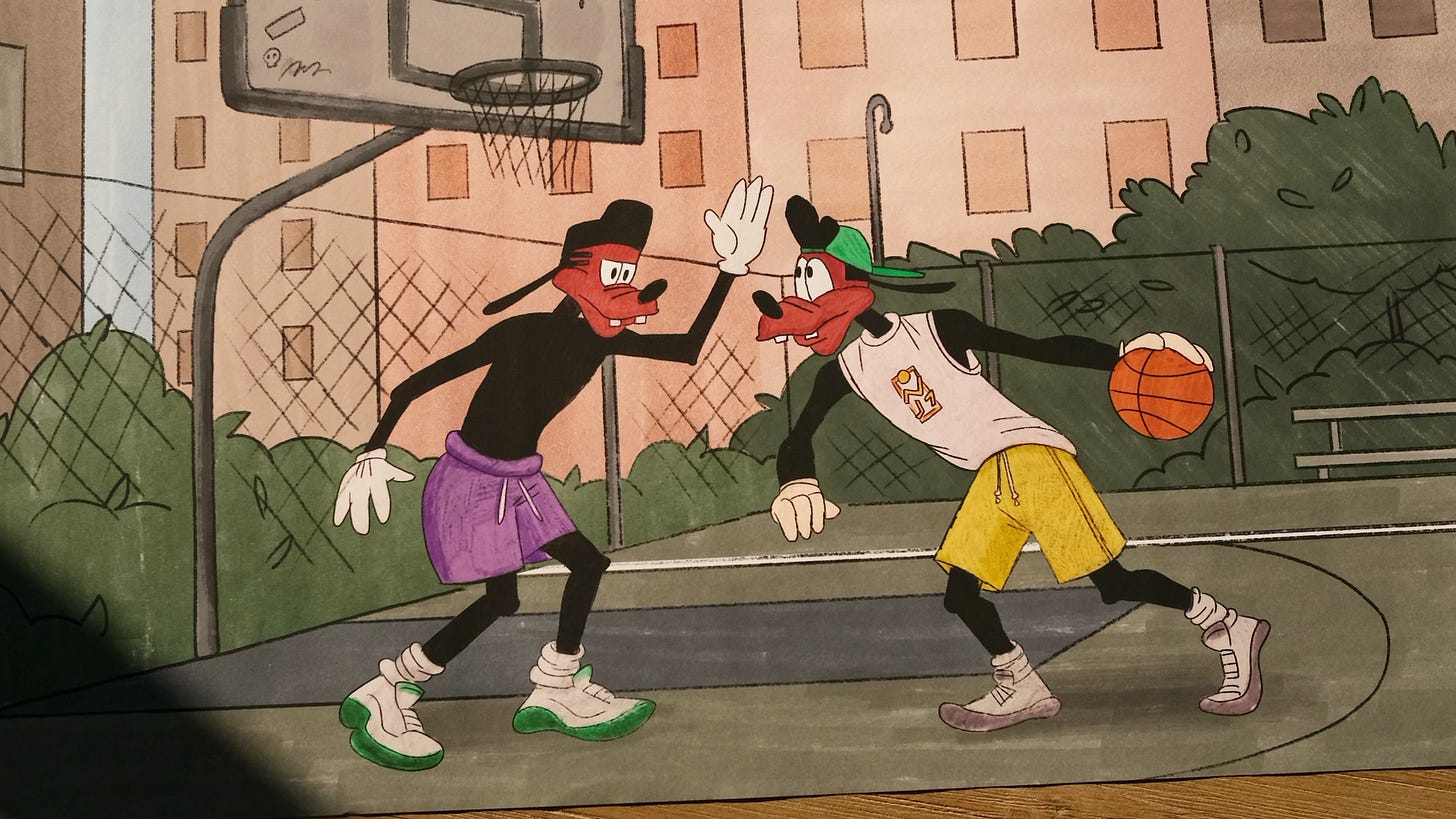goofy
Last week, the television show Atlanta aired a mockumentary about the making of A Goofy Movie, "The Goof Who Sat By The Door." The episode casts the 1995 film as a passion project of the fictional Thomas Washington, an animator who accidentally becomes Disney's first black CEO and sought to work that background into his work. Like many people who have asserted such in real life, Washington argues that Goofy is undeniably black, and the episode declares the film "the blackest movie of all time." (Others agree.) The whole episode is well-done, and is somewhat audacious given that FX, the network on which Atlanta airs, is now owned by Disney.
I will admit that I have also been looking forward to this episode for months, without even knowing its contents. This was because of an email I received this past June from a Legal Clearance Specialist at Disney, looking to contact a source I’d spoken to for a story I’d written in 2018.
In 2018, I interviewed Tiara Seddens, an artist specializing in fan art, who drew cartoon characters from TV shows and movies in different, more culturally specific contexts. Her most enduring image was one of Max from A Goofy Movie, dressed in streetwear, complimenting Roxanne, also in streetwear, which the now famous line "Wow Queen, you're so beautiful" (seen above). The sketch is earnest and not exactly professional quality, making it easy to make fun of or, at least, riff on. Many did. At some point, an altered version featuring the characters in a disheveled apartment appeared. In this one, Max says, "Damn, bitch, you live like this?"
Because I am the only journalist who has ever interviewed Seddens about the picture, Atlanta's production team had turned to me. (Getting in touch with her the first time was a little complicated as well: when Instagram DMs failed, I found her mother in the comments, and sent her a Facebook message to the effect of "I swear I'm not a total freak, I just want to ask your daughter about her art.") There is, obviously, something clearly funny about a company as large and protective of its works as Disney seeking permission to use fan art of characters it otherwise owns. Especially in a TV episode critical of Disney.
So I dug through the email archive I had from my old job1, found Seddens's contact info, got her permission, and then shared that contact info with the Atlanta team. I also noted diplomatically that I hoped Disney was prepared to compensate her fairly. One producer, thankful for the assist, said that, "Her work is a big inspiration for what we're doing."
And that was the end of the interaction. I don’t know what came of it and I didn’t ask for more info, since I was simply a go-between. I just kinda assumed that a show like Atlanta, attuned to how people actually use the internet in practice, would throw the image up on a character's phone in the course of some surreal romp and that would be that. But the Goofy episode is something stranger and better.
Seddens's drawing, in its "Damn, bitch, you live like this?" variant (author unknown), appears right at the end of the episode. The fictitious son of Thomas Washington, Max, references it as a descendant of A Goofy Movie, its explicit blackness, and his father's mission. "You know that 'Damn, you live like this?' meme?" he asks. "It's so funny to me because the essence of it is those drawings he did in college. Black folks living their lives, being funny, being free, being real."
The episode mocks up a couple of the drawings Washington did in college, in a series called, “Goofy, Please.” I have a guess as to at least one reference point that might have inspired them.
What's interesting here, to me at least, is how the episode flips chronology on its head. In the episode's fiction, Seddens’s meme is a result of A Goofy Movie being an explicitly black production, as opposed to the meme being what it is an real life: an expression of something only implicit in the film and only expanded on through subsequent critical interpretation.
In other words, in the episode, Thomas Washington inspires the meme; in reality, the meme clearly inspired the episode's alternate history. To rephrase this scenario even more simply: Tiara Seddens's drawing eventually led to an entire episode of critically acclaimed, prestige television. I think that's really cool on both ends — that someone's sketches could travel so far across the internet, and that someone on the receiving end could engage with that work so comprehensively.
I figured I'd write this up because it's a cool, neat little pop culture story. I'm also writing this for posterity because, as far as I can tell, Tiara Seddens isn't listed anywhere in the credits.
Thank you for reading BNet.
In late 2019, my employer was acquired by a larger company — one that I assumed was going to be more aggressive in treating email correspondence with sources as work product, and subsequently, company property. In many cases, my emails contained the only interviews with certain internet-culture figures, and so I exported a local copy of my entire email archive before it migrated over to their system. After the migration, as expected, the ability to export was disabled. All of that information in my inbox would otherwise be gathering dust had I not retrieved it. If you’re a journalist that conducts work with sources over a company email account, it’s worth looking into your employer’s policy on the matter — and then shaming them into changing it.






